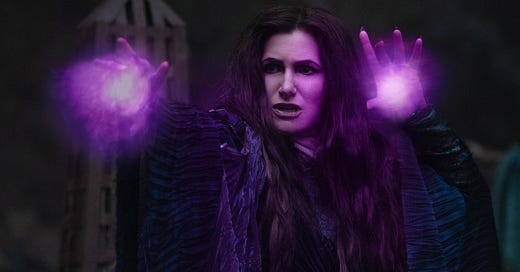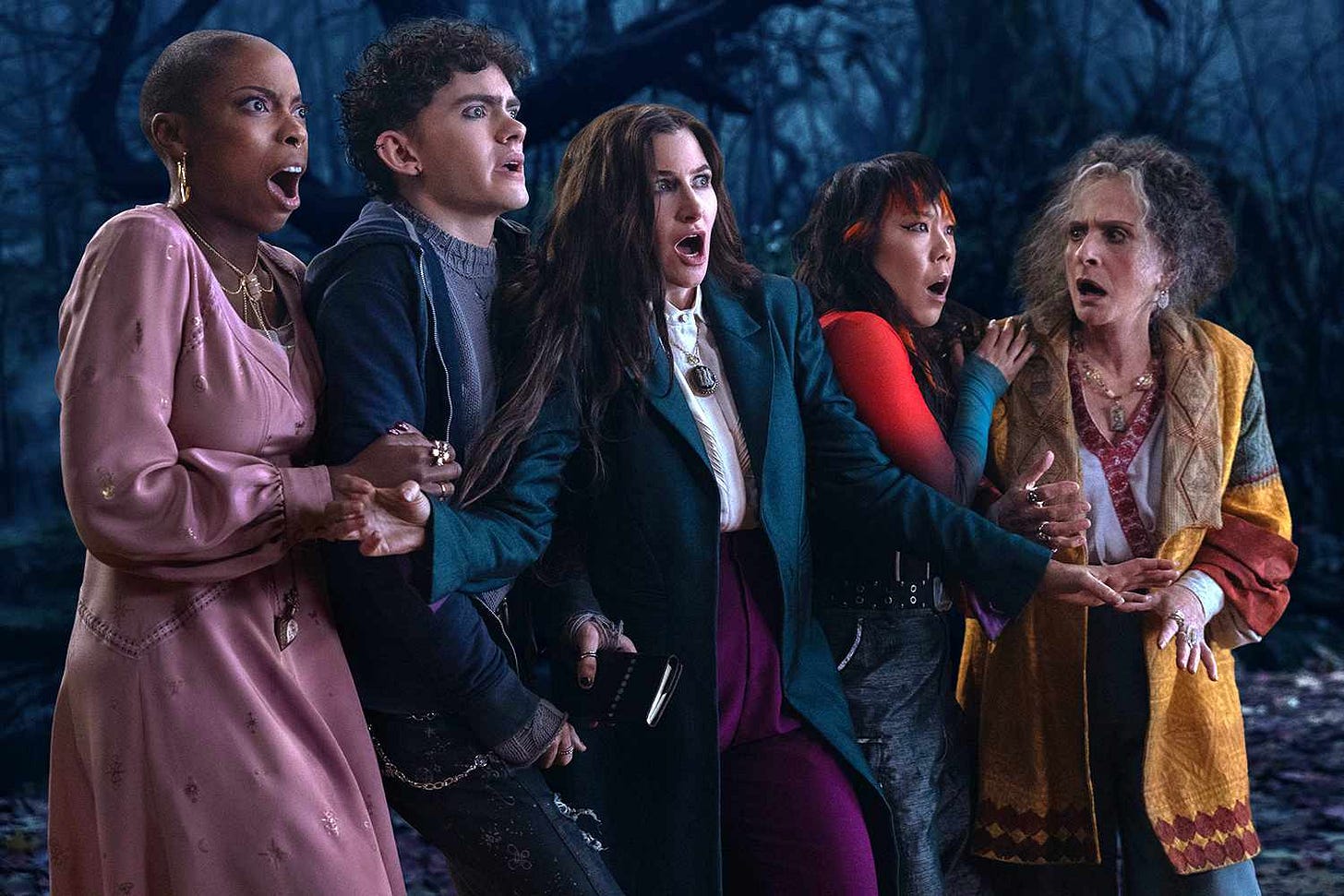Marvel Studios’ Agatha All Along, produced and directed by Jac Schaeffer, brings Agatha Harkness (Kathryn Hahn) back into the spotlight after her role in WandaVision. This spinoff expands on the powerful witch’s backstory while also exploring themes of trauma, self-discovery, and representation in modern media.
To fully appreciate Agatha All Along, having a familiarity with WandaVision is vital as the plots of the two shows are deeply intertwined.
In WandaVision, Wanda Maximoff (Elizabeth Olsen), also known as the Scarlet Witch, and Vision (Paul Bettany) appear to live an idyllic suburban life in Westview, New Jersey. As strange events unfold, it’s revealed that Wanda is projecting her powers to create a false reality where Vision is alive, and the two live through various sitcom eras.
Agatha, a powerful Salem witch, is introduced in WandaVision as Wanda’s best friend and ‘neighbor to the right,’ under the alias Agnes. Over time, it's unveiled that Agatha has been manipulating Wanda to learn about her magical abilities. Agatha takes power from those she deems undeserving and attempts to steal Wanda’s power for herself.
At the end of WandaVision, Wanda leaves Agatha under a spell, forcing her to remain in the role of ‘the nosy neighbor.’ Agatha All Along picks up with Agatha living under the pretense of being a detective (a parody of Mare of Easttown) until she is freed from Wanda’s spell when Teen (Joe Locke), a baby witch, uses a spell to release her mind.
Teen, who is revealed to be Wanda’s son Billy Maximoff, searched for Agatha so she could take him down The [Witches] Road–a journey that will grant “the thing [they] want the most.” Billy sought out Agatha since she is the only known witch who has ever left The Road alive. To take on The Road, the pair gathers a group of witches, some of which—Patti Lupone as Lilia Calderu and Aubrey Plaza as Rio Vidal—viewers will recognize. The trials this coven faces on The Road crack open each witches deepest traumas.
While Agatha was supposed to be the villain in WanadaVision, this series explores a more complicated yet caring Agatha.
"So you broke the rules. Big deal. That's what kept you alive. That's what makes you special. It's what makes you a witch." -Agatha Harkness to Billy Maximoff
Representation is crucial for underrepresented communities to see themselves reflected on screen, to be recognized and understood by the media. Witches are not just those with magical powers; they are the ones who break the rules and defy social norms.
One of the most groundbreaking aspects of Agatha All Along is its representation of older women. In mainstream media, older women are often sidelined, depicted as sickly or weak. In contrast, the show places strong, empowered, and complex women at its center, showing that age does not diminish one's power, it helps it flourish. The six lead women—each over 40—represent a diverse mix of backgrounds, challenging the stereotypes about women aging.
This is all intertwined with the fact that they are all eminently powerful witches and far from ‘sickly.’ Society doesn’t listen to women, more so as they get older. Older women are not invisible beings. They are visible–they take up space–and they are in the greater conversation. They are your mothers, actors, doctors, therapists–they are everywhere and they are the backbone of our society. It is so meaningful and impactful to have a show that gives older women the representation they deserve. A woman’s age doesn’t diminish her desirability, intimacy, or sensuality. Agatha All Along battles this negative stereotype by having the main female characters as exes with sexual tension who are two of the most powerful witches in the Marvel Cinematic Universe.
Agatha All Along features the first openly queer women in the MCU—Agatha and Rio—showcasing a compelling and necessary love story for broader lgbtqia+ visibility.
This is significant not just for representing older women but queer women too. While queer representation in the media has been steadily increasing, queer women remain underrepresented compared to their male counterparts. Projects like Agatha All Along help normalize queerness, particularly at a time when there are still many who fail to see lgbtqia+ people as human. This show pushes those boundaries, creating space for inclusive and authentic portrayals of queer identities, especially those that are often overlooked in mainstream media; however, Agatha and Rio are the only openly queer women in the MCU., with the only other openly queer person in the MCU being Phastos (Brian Tyree Henry) from Eternals.
This progress aligns with the show’s shift toward the female gaze and away from the male gaze. This shift in gaze may result from the the lead directors and producers of the show being women. The ‘male gaze’ in the media is exemplified by the oversexualization and objectification of women intended for male audiences. In contrast to the male gaze, the female gaze is focuses on the full breadth of experiences and emotions of female characters. Agatha and Rio’s relationship focuses on their desires and perspectives, rather than how they are perceived by men. It’s refreshing that Agatha All Along shows the humanity and individuality of women rather than rendering them as objects of male pleasure.
The dominance of the male gaze in media compelled cartoonist Alison Bechdel to create The Bechdel Test. The Bechdel Test is an assessment of the representation of women in the media. It checks whether a work includes at least two female characters who have a conversation with each other about something other than a man. This test was created because it was rare for female characters to pass this test. Agatha All Along passes this test with flying colors for all episodes, which is so reassuring that as a society we are decentering men in women’s stories.
This change doesn’t just make the stories we watch more engaging; it also sends a clear message for the future of media, pushing for more inclusive and well-rounded portrayals of women. The Bechdel Test might be just one way to measure this, but its increasing relevance shows that there's a larger shift happening toward more diverse and complex female characters in film and TV.
Agatha All Along is a game-changer for both the MCU and mainstream media. Not only does it expand on a fan-favorite character, but it also breaks important ground in terms of representation for older and queer women. By amplifying voices that are often marginalized, the show challenges outdated norms and proves that stories of power, identity, and love can come from anyone—no matter their age or sexual orientation. Whether you're young or old, man or woman, gay or straight, or anything in between, it's important to engage with works such as this to learn how to be better advocates.






